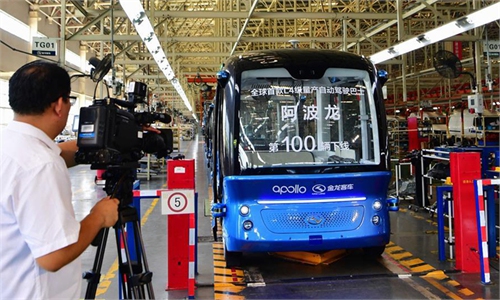
A woman takes a self-driving taxi at an appointed location on the Daoxianghu Road in Haidian District of Beijing, capital of China, Oct. 14, 2020. China's internet giant Baidu has launched a program in Beijing to offer free trials of its self-driving taxi service from Saturday. The pilot service, which serves certain stops in a part of the city from 10 a.m. to 4 p.m., will operate until Nov. 6, according to Baidu. (Xinhua/Ren Chao)
Chinese internet giant Baidu saw bids for its shares rise nearly 2 percent at the opening to HK$257 ($33.1) in gray-market trading on Monday, one day before its IPO in Hong Kong, the latest example of US-listed Chinese companies turning to Hong Kong for secondary listings amid tougher scrutiny and increasing hostility from the US.On Monday, it announced plans to sell 11.4 million shares at Hong Kong stock market while selling 95 million shares globally. Each share is priced at HK$252, with around HK$24 billion expected to be raised by the Chinese search engine and AI giant.
Its pricing reflects lukewarm investor sentiment, according to some overseas media, compared with other mainland tech giants' IPOs in Hong Kong such as that of Tencent-based Kuaishou, which raised over $6 billion. Experts agreed that the fundraising scale of Baidu is limited, but its pricing in Hong Kong is at a reasonable level.
"Baidu is not one of those companies that are thirsty for funds because of a high valuation and profits, and its financing scale is limited," Thomas Yeung, vice dean of the Futian School of Finance and an economist in Hong Kong, told the Global Times.
Dong Dengxin, director of the Finance and Securities Institute at the Wuhan University of Science and Technology, noted that Baidu's IPO in Hong Kong is more of a "symbolic" gesture as the company prepares for avoiding uncertainties in the US.
"The hostility of US government policies toward Chinese high-tech companies is making many Chinese companies feel unsecure, while Chinese tech giants like Alibaba have set an example of returning to the Hong Kong market, leading more to follow suit," Dong said, adding that more companies including Baidu will consider a retreat from New York to come back home.
Among those who plan to return are China's three new-energy vehicle start-ups -- Li Auto Inc, Nio Inc and Xpeng Inc -- which plan to list in Hong Kong this year, Reuters reported.
The Hong Kong stock market will be the one that benefits the most from such a migration, experts said, considering its superiority over the mainland A-share markets in trading convenience.
According to Dong, there's almost no difference between the IPO thresholds or procedures in Hong Kong and the Nasdaq. "For companies that return to Hong Kong market, they get to benefit from mainland capital with the stock connect regime, while they can also get access to global investors easily with Hong Kong's international financial center status."
He also noted that the rise of the technology sector on Hong Kong's capital markets following these IPOs is supporting Hong Kong as a major global financial hub.
However, the rise of mainland tech companies on Hong Kong's markets brings some side effects as well, as some short-term speculative trading behavior has started to emerge in Hong Kong, Dong said.
"As mainland capital pours into Hong Kong, the market's investment style is likely to become more speculative, while old, lagging shares will become more marginalized," Yeung said.
He noted that at a time while some international institutions in Hong Kong are under political pressure to leave the city, the mainland companies' IPOs will discourage departures on a large scale.



